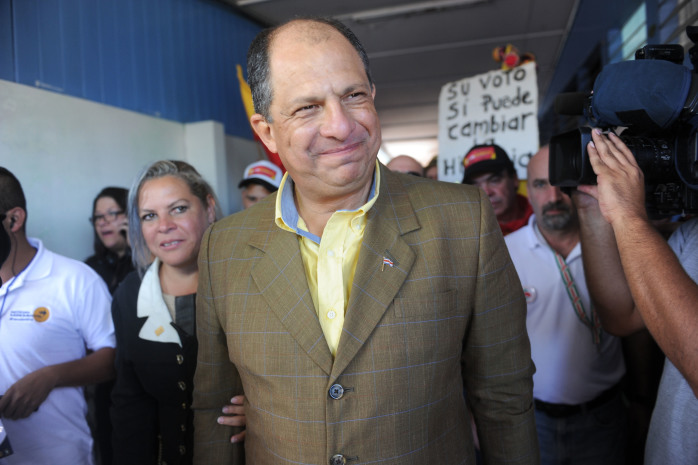The slow but steady drumbeat for Luis Guillermo Solís to announce his Cabinet is quickening as we near the April 6 presidential runoff election. With Johnny Araya’s early retirement from the campaign and Solís continuing his “Ruta de Alegría,” a campaign caravan that has wandered the Costa Rican countryside and city streets alike, the press has had little new to cover in this historic presidential campaign. This week, several newspapers and editorials renewed their call for Solís to start revealing his Cabinet choices. But it seems unwise and therefore unlikely that he will do so.
Here is why:
Whether the press has noticed or not, a campaign is still going on. Despite Araya’s sabbatical, the constitution is clear that on April 6, if he wins not more votes than Solís, but simply the same number, he will become Costa Rica’s next president. (The constitution dictates that in case of a tie, the older candidate wins the presidential election, and Araya is older than Solís by almost a year.)
Araya himself has declared that if he wins, he will assume the presidency. Although polling data continue to predict a Solís victory, polls in Costa Rica have proven unreliable in the past, and with ballots gone missing and a National Liberation Party machine gearing up to get out the vote for pride of party – if not for love of candidate – Solís has chosen to take nothing for granted.
Recommended: National Liberation Party faces vote-buying allegation, investigation
Imagine what the fourth estate would say if Solís had simply assumed the race was over and he began behaving as if he were the next president. The same political pundits who now call for him to announce his Cabinet choices would decry the hubris of such a move. Now imagine further the press reaction if Solís suspended his campaign, and on April 6, by hook or by crook, Araya were to win. Those “nattering neigh bobs of negativism” would waste little time converting what has been a serious campaign risen above the childish name-calling and accusations of the other candidates into the butt of jokes regarding an historic political loss and the surprise comeback of Johnny Araya. Solís’ decision to wait not only is wise, but also it is politically astute.
Solís’ announcement of Cabinet positions not only would be procedurally premature, but could only hurt him with the public. When he began this campaign, many voters argued they did not know the Citizen Action Party candidate. Prior to the February election, a sobering number of political debates were held in order to get to know Solís and other candidates. In the final one, he looked into the camera and said, “I am Luis Guillermo Solís, and now you know me, and I would appreciate if next Sunday you would make me president.”
A sufficient number of voters believed they knew him well enough, and he was propelled to the second round. Now many more are meeting him in person and finding they like what they see. Any announcements of Cabinet positions at this point would invite criticism from some quarter and would distract attention away from the campaign’s “Ruta de Alegría,” and from Solís’ joyful role as “the likely next president coming soon to a town near you.” Shaking hands, kissing babies, playing the güiro, and posing for voters’ photos is exactly the kind of attention Solís wants in the final days of a campaign.

Recommended: Johnny Araya is down and out, but not his party, says analyst
Another reason it is unlikely Solís will begin to announce his political appointments is that he really is avidly campaigning for votes. Araya’s refusal to participate in an election where he might actually be beaten has many voters feeling they need not bother to vote; “Solís will win anyway,” they think. The voter apathy and political absenteeism Araya’s decision has sown in the Costa Rican electorate has created a situation where Solís could be elected president by receiving the lowest percentage of eligible votes in the history of Costa Rican elections. The constitutionally provided runoff election was designed to prevent this outcome and give incoming presidents an electoral mandate. Conspiracy theorists among us might speculate this was the PLN’s intention all along when they stuffed Araya full of mothballs and locked him the closet. A president Solís without a public mandate is weakened from the start. Solís is deftly and confidently seeking 1 million votes, and as the crowds who attend his campaign rallies swell, as the number who “shake the hand of the future president” grows, and as the “selfies” taken with Don Luis Guillermo explode on Facebook and Twitter, candidate Solís becomes ever closer to his goal and his mandate for change.
Many in the press have confused Solís’ refusal to announce his Cabinet positions as inactivity, but this is simply more disingenuousness from the chattering class. Anyone who has been around political campaigns knows that a candidate at this stage in an election has long ago begun to consider who should be part of his government. That Solís is not sharing this information until after the election and has managed to keep it from leaking to the press demonstrates an adroitly run campaign as well as a respect for the democratic process. It also demonstrates that Solís understands only too well that regardless of press recriminations and semi-veiled threats, in politics “you don’t count your chickens before they are hatched.”
Gary L. Lehring is a professor of government at Smith College, Northampton, Massachusetts. He is on sabbatical in Costa Rica. Read more of his columns by clicking on the hashtag #Elections 2014.





